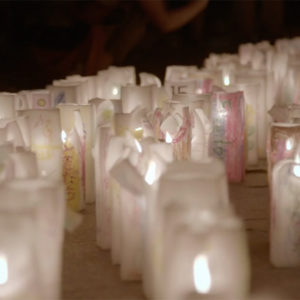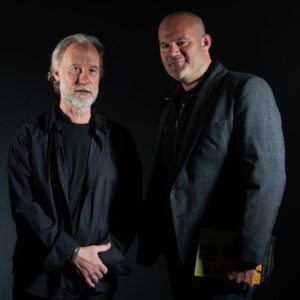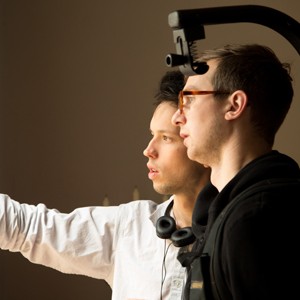Henry Hughes grew up an army brat, moving with his parents, both in the service, to bases across the United States and Europe. He followed in the footsteps of his mother, a captain, and his father, a colonel, first enrolling in BU’s ROTC program and then shipping off to Afghanistan immediately after graduation, where he served two combat tours as a paratrooper in the 173rd Airborne.
Hughes (COM’06) drew on this combat experience in making his film, Day One. The story was influenced by his real-life interpreter in Afghanistan. Day One not only won critical accolades, but was one of five films nominated for best short film (live action) at the 88th annual Academy Awards ceremony in February.
Day One focuses on Feda, a recently divorced Afghan American woman who is ostracized by her conservative Muslim community at home in the United States. She goes to Afghanistan as an interpreter for the US Army, and on her first day on the job, helps the unit search for a local terrorist. She ends up helping deliver a local woman’s baby, being born in the breech position, since local custom forbids soldiers from entering the room.
The 25-minute film, which screened at the Cannes and Telluride Film Festivals, won the Narrative Gold Medal at the Student Academy Awards, two College Emmys for Best Drama and Best Directing, and the BAFTA Student Award. It was also the 2015 Redstone Film Festival alumni winner in spring 2015.
Hughes enrolled in the American Film Institute a year after returning from Afghanistan, and he wrote and directed the film for his MFA thesis project. “Transitioning out of the military is difficult, so I thought it was important to find a structured program,” he says. “I thought, why not dip my toe into education. I had been away from it for a long time—five years—and you lose a lot of the skills you learn, I suppose.”
When writing Day One, Hughes set out to tell a different kind of war story from those depicted in such recent films as American Sniper, Zero Dark Thirty, and The Hurt Locker. “A lot of the war films are about people like me: a young guy goes to war,” he says. “But I thought, we haven’t seen anything new and it would be perfect to have a story about a woman stuck between two conservative male cultures.”
He realized that he had the ideal muse in his former coworker. He describes her as irreplaceable, saying that since he didn’t speak the local language, she acted as his voice during the tour. He compares the relationship between soldier and interpreter to the scene in the film Saving Private Ryan where the medic dies: his team realizes that he had a skill that no one else possessed. But central to his film’s story, Hughes says, is the struggle and position the interpreter faces straddling two nationalities and cultures.
While Day One is fictional, two moments from real-life combat made their way into the film. The first was the soldiers’ harrowing search for IEDs along the road one day. They found several of the devices, but knew they hadn’t managed to find them all. Hughes recalls stopping to relieve himself the next morning and seeing a civilian on a motorcycle drive past. He didn’t warn the man (“a simple oversight,” he says), who accidentally drove over and detonated one of the devices and was killed. The second real-life incident: Hughes would use a dog leash to stay close to his interpreter in the field. “In one firefight, she was falling and running to catch up, and I was holding on to her, but I needed my hands to fight,” he recalls. “So I attached a dog leash to my back so she could hold onto that.”
Hughes’ path from paratrooper to filmmaker (a goal he’d aspired to since high school) caught the attention of ABC News’ Standing Up for Heroes, a series that helped returning vets find meaningful careers by pairing them with experienced mentors through the American Corporate Partners’ Nationwide Mentoring Program. Hughes was matched with legendary filmmaker George Lucas, creator of Star Wars, who worked with him for two years. Lucas gave notes on Day One, asked probing questions like how he viewed filmmaking and who he was really making the film for. He also introduced Hughes to his teams at Lucasfilm and Industrial Light & Magic, who assisted with Day One’s lighting and sound.
Hughes says his wish is that the film can help audiences in trying to make sense of the combat experience.
“I couldn’t tell you what war is and I can’t define combat, but I can share with people what it felt like in these sublime moments that take place during war, where they are horrible and beautiful at the same time. You are overcome by an event, and you don’t know how to understand it,” Hughes says. “That was my goal with this film, my hope.”
















































War is still a war will always wound the scars.